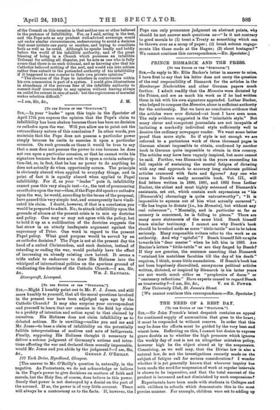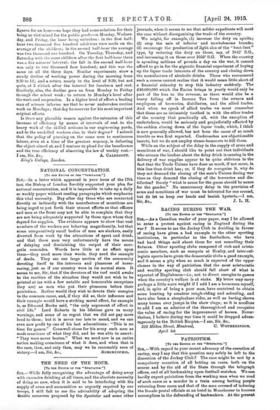THE NEED OF A. REST DAY.
[To T. EDITOR or 71/IN Srxcnroa..] SIR,—Sir John French's latest despatch contains an appeal for continued supply of ammunition that goes to the heart; it must be responded to without reserve. In order that this may be done the efforts must be guided by the very beat and wisest laws. Reflecting on this, I cannot but desire to express grave doubts as to whether the high pressure which ignores the weekly day of rest is not an altogether mistaken policy, however high be the object aimed at by the suspension_ Conceiving, as we well may, that the Divine law is also a natural law, do not the investigations recently made on the subject of fatigue call for serious consideration ? I wonder whether it is yet generally known that wherever inquiry has been made the need for suspension of work at regular intervals is shown to be imperative, and that the total amount of the product is increased and not diminished by such nispensionaP Experiments have been made with students in Colleges and with children in schools which demonstrate this in the most precise manner. For example, children were set to adding up figures for an hour—we hope they bad some solatium for their being so victimized for the public good—on Monday, Wednes- day, and Friday, the hour being nnbrokeu : in the first half- hour two thousand five hundred additions were made on the average of the children ; in the second half-hour the average was two thousand one hundred. On Tuesday, Thursday, and Saturday with the same children after the first half-hour there was a five minutes' interval : the fall in the second half-hour was only to two thousand four hundred; and this was the same on all the three days. Similar experiments show a steady decline of working power during the morning from 9.30 to 12; and a return nearly to the level of 9.30, but not quite, at 2 o'clock after the interval for luncheon and rest. Similarly, also, the decline goes on from Monday to Friday through the school week : to return to Monday's level after the week-end suspension. In a higher level of effort a leading man of science informs me that he never undertakes routine work on Mondays; that day he reserves for his most important original efforts.
Is there any plausible reason against the extension of this increase of efficiency by means of intervals of rest to the heavy work of the skilled artisans in our engineering yards, and to the unskilled workers also, in their degree P 1 submit that the policy of pressing on the same men to continuous labour, even at a time of the greatest urgency, is defeating the object aimed at, and I venture to plead for the beneficence and the true efficiency of observing the law of weekly rest.—















































 Previous page
Previous page